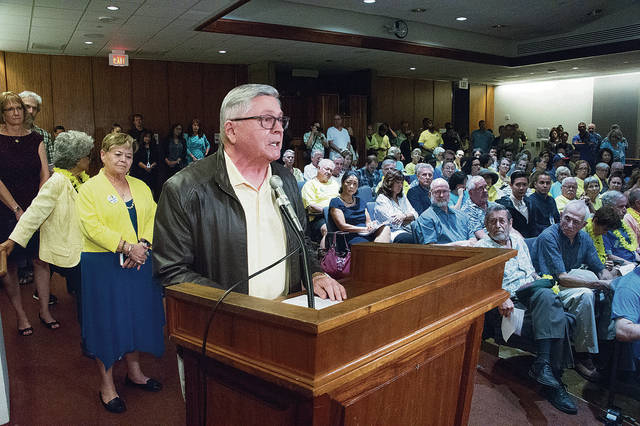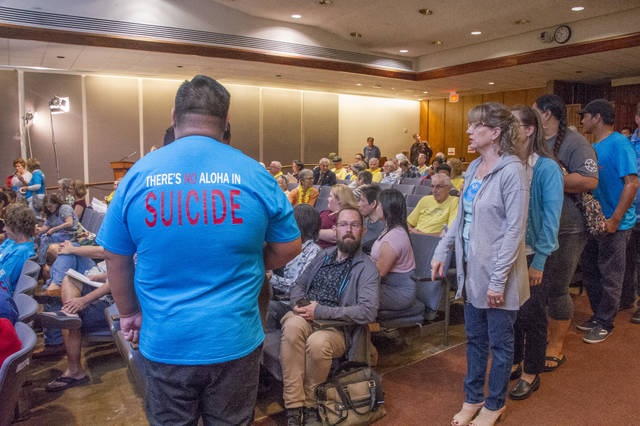Kathleen Hashimoto — who says she underwent 18 surgeries, chemotherapy and lengthy hospital stays after contracting a rare form of kidney cancer from a transplanted kidney — implored lawmakers Tuesday not to advance a bill that would allow terminally ill patients to obtain prescriptions for lethal doses of medication.
“No one with the type of cancer I had has ever lived beyond eight months,” Hashimoto said. “But incredibly and thankfully I was miraculously healed and kicked out of hospice five months later (in 2009),
confounding my doctors. … I fear, though, to imagine what choice others in this situation might make if
lethal drugs are available.”
Hashimoto was one of
120 people who signed up to testify Tuesday on House Bill 2739 Opens in a new tab before a joint hearing of the House Health and Human Services and Judiciary committees.
Under the bill dubbed the Our Care, Our Choice Act, adult patients with less than six months to live could submit two verbal requests a minimum of 15 days apart and one written request for a lethal prescription to the physician or advanced-practice registered nurse who is providing them care. Two health care providers would need to confirm the patient’s diagnosis, prognosis, competence and that the request is voluntary.
Patients would have the right to rescind a request at any time, regardless of their mental state, and the bill calls for criminal penalties for tampering with a
patient’s request for a prescription or coercing a patient to request a prescription.
After listening to four hours of often emotional testimony split in favor and against the measure, the committees decided to postpone a vote until noon today in Room 329 of the state Capitol.
State Rep. John Mizuno, chairman of the House Health and Human Services Committee, said lawmakers needed additional time to work through concerns raised during the hearing about safeguarding patients and preventing abuse of the law.
“On a bill of this magnitude, we could not just come up with a quick decision,” Mizuno (D, Kamehameha Heights-Kalihi Valley) said afterward. “We’re dealing with lives here, and … we need to ensure the proper safeguards and adequate safeguards are in there. Rest assured, we’re going to be working all night on this bill, and if we can craft something that’s of sound policy and we feel it’s right, then it’s got a shot of passing (today) at noon.”
It was unclear Tuesday whether the bill had the needed votes to move forward.
House Majority Leader Della Au Bellati serves on the Health and Human Services Committee and is lead sponsor of the bill. A bill last legislative session cleared the Senate but was tabled Opens in a new tab in the House by a committee that Belatti was chairwoman of at the time.
The last time the full Legislature took up the idea was in 2002, when Hawaii came within three Opens in a new tab Senate votes of passing a death-with-dignity bill.
During Tuesday’s hearing, supporters included terminally ill patients and relatives along with health care workers who contend that mentally competent individuals should have the option of ending their lives peacefully rather than suffering from painful illnesses.
Retired lobbyist John Radcliffe, who was diagnosed in 2014 with inoperable colon cancer, testified in support. He said he has so far outlived his prognosis by
20 months and last week completed a 58th round of chemotherapy.
“I am hoping to go where it takes me, but my prognosis remains six months or less. There are good days and bad, but mostly good,” Radcliffe said. “What would be bad is if this option for a peaceful death not be approved.”
Merril Roger Goodell, a retired geriatric nurse practitioner and retired fire captain, also supported the bill.
“I have been present at the end of life in a variety of settings, performing CPR on bedroom floors as well as (intensive care unit) beds,” he said. “Death can be hard, and if expediting it lessens the pain of it, then I want to be able to do it. I know my God won’t mind.”
Opponents, meanwhile, included those identifying as believers of various faiths who read Bible passages and argued that life should be treated as a sacred gift.
Strider Didymus, calling himself a true man of God, scolded lawmakers. “You want to play God and
legalize murder — that’s what this bill is,” Didymus said, calling lawmakers “pawns of the Evil One” and eliciting amens from some in the audience.
Deacon Walter Yoshimitsu with the Hawaii Catholic Conference, which represents the Roman Catholic Church in matters of public policy, also testified in strong opposition.
“With my whole heart and my soul, I believe in the sanctity of life, that life is a God-given gift,” retired Circuit Judge Artemio Baxa of Maui said. “It should be revered at all times, in good health and in sickness.”
Mary Smart with the Hawaii Federation of Republican Women told lawmakers, “This is mercy killing and euthanasia.”
Some health care workers also opposed the bill, warning that patients might end their lives prematurely and saying pain relief is already available through hospice and palliative care. Advocates for the disabled also raised concerns that people with disabilities could be adversely affected.
Medically assisted death is legal in the District of Columbia and five states: California, Colorado, Oregon, Vermont and Washington.
Kat West, national director of policy and programs for the Oregon-based nonprofit Compassion &Choices, which advocates for improving and expanding end-of-life choices, told lawmakers there have been no cases of abuse in other states.
“Medical aid in dying is a safe and trusted practice. Opponents … try to use scare tactics by painting a dark picture of fraud, coercion and murdering relatives,” West said. “These scare tactics include concerns the law would target the disabled, elderly, frail, uninsured or any vulnerable groups. These dire predictions simply do not happen.”




